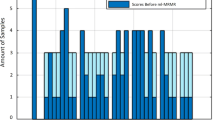Abstract
Depression is a common psychological disorder with high relapse rate in modern society. Due to weak self-perception and fear of public bias, most relapse patients fail to receive timely treatment. Aiming to provide a self-monitoring means in home environment and daily life, this paper studied the machine learning and natural language processing technologies for extracting the patient’s acoustic features and semantic features from the designed speech diagnostic test, and proposed an improved CNN-LSTM learning model suitable for the monitoring, which can combine acoustic features, semantic features, weather and environmental information as well as the patient’s personalized features for achieving ideal results. On this basis, an intelligent mobile system is designed for daily monitoring on the relapse of depression.
Access this chapter
Tax calculation will be finalised at checkout
Purchases are for personal use only
Similar content being viewed by others
References
Boniwell, I.: Positive psychology in a nutshell: A balanced introduction to the science of optimal functioning. Personal Well-Being Centre (2008)
Lépine, J.P., Briley, M.: The increasing burden of depression. Neuropsychiatr. Dis. Treat. 7(1), 3–7 (2011)
Belmaker, R.H., Agam, G.: Major depressive disorder. N. Engl. J. Med. 358(1), 55–68 (2008)
Lyness, J.M., Bruce, M.L., Koenig, H.G., et al.: Depression and medical illness in late life: report of a symposium. J. Am. Geriatr. Soc. 44(2), 198–203 (1996)
Angst, J., Azorin, J.M., Bowden, C.L., et al.: Prevalence and characteristics of undiagnosed bipolar disorders in patients with a major depressive episode: the BRIDGE study. Arch. Gen. Psychiatry 68(8), 791–799 (2011)
Teasdale, J.D., Segal, Z.V., Williams, J.M.G., et al.: Prevention of relapse/recurrence in major depression by mindfulness-based cognitive therapy. J. Consult. Clin. Psychol. 68(4), 615–623 (2000)
Cohn, J.F., Kruez, T.S., Matthews, I, et al.: Detecting depression from facial actions and vocal prosody. In: Proceedings of the 3rd International Conference on Affective Computing and Intelligent Interaction and Workshops, Amsterdam, pp. 1–7 (2009)
Jiang, H., Hu, B., Liu, Z., et al.: Investigation of different speech types and emotions for detecting depression using different classifiers. Speech Commun. 90, 39–46 (2017)
Taguchi, T., Tachikawa, H., Nemoto, K., et al.: Major depressive disorder discrimination using vocal acoustic features. J. Affect. Disord. 225, 214–220 (2018)
Ma, X., Yang, H., Chen, Q., et al.: DepAudioNet: An efficient deep model for audio based depression classification. In: Proceedings of the 6th International Workshop on Audio/Visual Emotion Challenge, New York, pp. 35–42 (2016)
Lang, H., Cui, C.: Automated depression analysis using convolutional neural networks from speech. J. Biomed. Inform. 83, 103–111 (2018)
Chao, L., Tao, J., Yang, M., Li, Y.: Multi task sequence learning for depression scale prediction from video. In: Proceedings of the International Conference on Affective Computing and Intelligent Interaction. Lisbon, pp. 526–531 (2015)
Alghowinem, S., Goecke, R., Epps, J., et al.: Cross-cultural depression recognition from vocal biomarkers. In: Proceedings of the 17th Annual Conference of the International Speech Communication Association, San Francisco, pp. 1943–1947 (2016)
Alghowinem, S., Goecke, R., Wagner, M., et al.: Detecting depression: A comparison between spontaneous and read speech. In: Proceedings of the 2013 IEEE International Conference on Acoustics, Speech and Signal Processing, New York, pp. 7547–7551 (2013)
Paltoglou, G., Thelwall, M.: A study of information retrieval weighting schemes for sentiment analysis. In: Proceedings of the 48th Annual Meeting of the Association for Computational Linguistics, Uppsala, pp. 1386–1395 (2010)
Wang, H.Q, W., Yang, W.: A hybrid very short text classification model based on sentiment orientation and SVM. Science and Technology Bulletin, 34(8), 149–154 (2018)
Kim, Y.: Convolutional Neural Networks for Sentence Classification, arXiv preprint, 1746–1751 (2014)
Wang, R.: Research on Short Text Representation and Classification Based on Convolutional Neural Network, Shandong Normal University (2018)
Cobb, B.S., Coryell, W.H., Cavanaugh, J., et al.: Seasonal variation of depressive symptoms in unipolar major depressive disorder. Compr. Psychiatry 52, 1891–1899 (2014)
Eyben, F., Wllmer, M., Schuller, B.: Opensmile: the munich versatile and fast open-source audio feature extractor. In: Proceedings of the 18th ACM International Conference on Multimedia, pp. 1459–1462 (2010)
Beritelli, F. Grasso, R.: A pattern recognition system for environmental sound classification based on MFCCs and neural networks. In: Proceedings of 2008 International Conference on Signal Processing and Communication Systems, pp. 1–4 (2008)
Li, J.M., Fu, X.Y.: Audio depression recognition based on deep learning. Comput. Appl. Softw. 36(9), 161–167 (2019)
Acknowledgements
This work was supported by Project of Ministry of Education of China (No.18YJA630019, 19JZD010), National Natural Science Foundation of China (No. 71971066), and Undergraduate Program of Fudan University (No.202011, No.202010). Wenyi Yin, Chenghao Yu, Pianran Wu are the joint first authors, and Weihui Dai is the corresponding author of this paper.
Author information
Authors and Affiliations
Corresponding author
Editor information
Editors and Affiliations
Rights and permissions
Copyright information
© 2023 The Author(s), under exclusive license to Springer Nature Singapore Pte Ltd.
About this paper
Cite this paper
Yin, W. et al. (2023). An Intelligent Mobile System for Monitoring Relapse of Depression. In: Sun, Y., et al. Computer Supported Cooperative Work and Social Computing. ChineseCSCW 2022. Communications in Computer and Information Science, vol 1681. Springer, Singapore. https://doi.org/10.1007/978-981-99-2356-4_15
Download citation
DOI: https://doi.org/10.1007/978-981-99-2356-4_15
Published:
Publisher Name: Springer, Singapore
Print ISBN: 978-981-99-2355-7
Online ISBN: 978-981-99-2356-4
eBook Packages: Computer ScienceComputer Science (R0)





